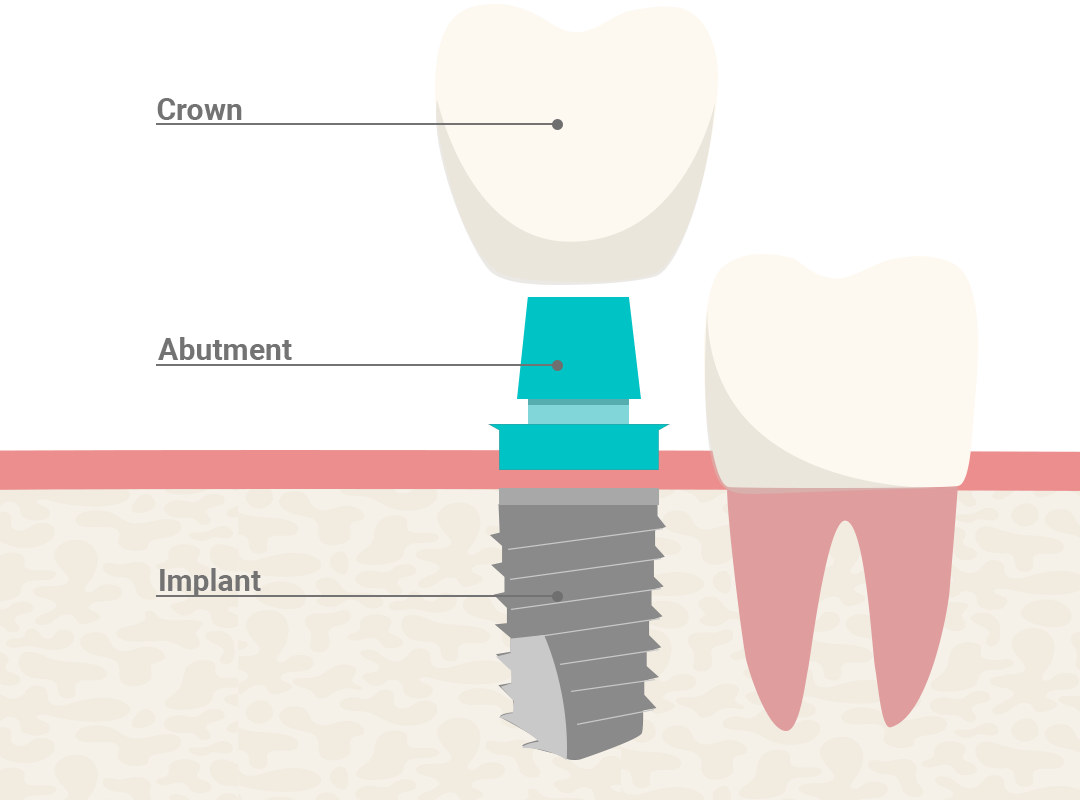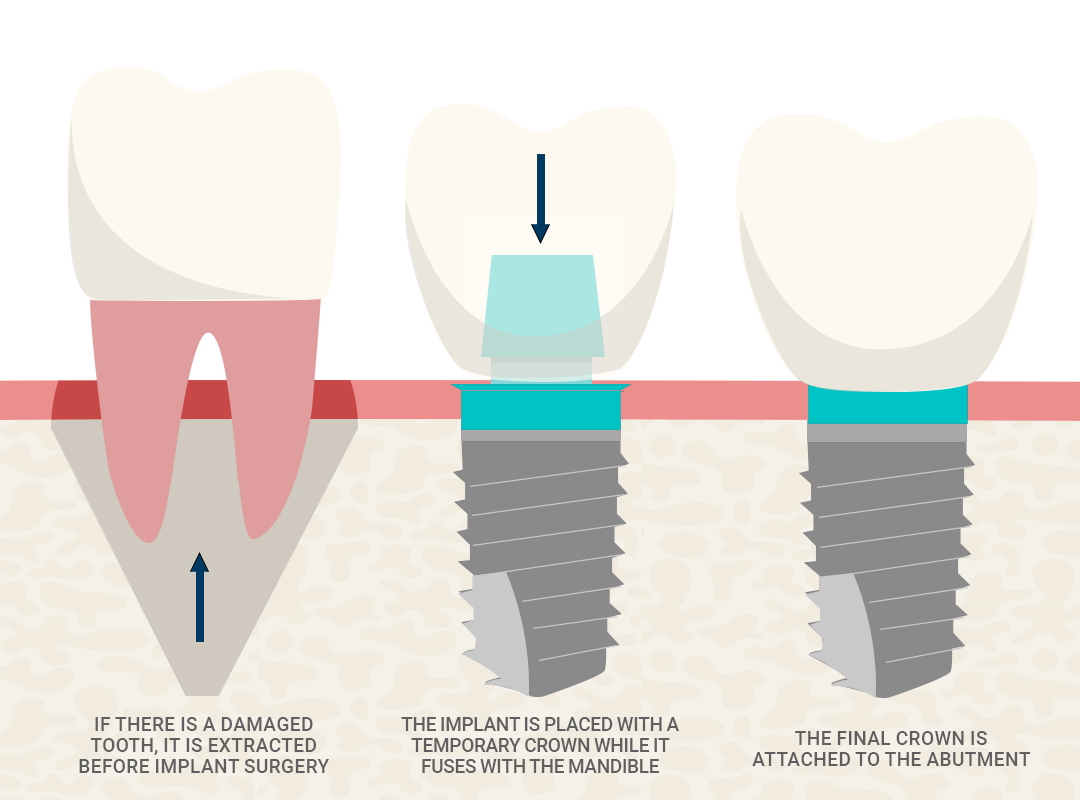How Do Dental Implants Work?

Dental implants are a great solution for replacing missing teeth. The artificial roots are placed into the jawbone to support a replacement tooth, bridge, or denture. They are made of titanium, a material that is well tolerated by the body and fuse with the bone over time.
They look like natural teeth and can be used to replace one or several missing teeth. Dental implants are made up of three parts: the implant, the abutment, and the crown. The implant is placed in the jawbone, and the abutment is attached to it. The crown is then attached to the abutment.
How to Prepare for Dental Implants?
When you are preparing to have dental implants, there are a few things that you need to keep in mind. First, you will go through a thorough dental exam to determine if you are a candidate for implants. You will need to have healthy gums and enough bone density to support the implant. If you do not have adequate bone density, you may need to consider a bone grafting procedure before getting implants.
Bone Grafting for Dental Implants
Bone grafting is a surgical procedure that is used to replace missing bone in the body. This procedure can be used to replace bone that has been lost due to an injury or disease, or to help support a dental implant. Bone grafting is most used in the jawbone, but it can also be used in other parts of the body.
The bone grafting procedure involves taking bone from another area of the body, or using a synthetic or natural bone substitute, and transplanting it to the area where the missing bone is located. In some cases, the bone graft may be taken from a donor site, such as the hip. Once the bone graft has been transplanted, it will fuse with the existing bone over time. This process can take several months, but it is essential for the success of the dental implant.
If you are considering dental implants, your dentist will first need to determine if you are a good candidate for the procedure. One of the key factors that will be considered is the amount of healthy bone present in the jawbone. If there is not enough healthy bone, you may need to undergo bone grafting before you can have dental implants.
Placing the Implant
A dental implant is a small post that is surgically placed into the jawbone. Once in place, a dental implant acts as an anchor for a replacement tooth, or crown. The process of placing a dental implant is usually performed by an oral surgeon or periodontist and takes about an hour. First, the area around the implant site is numbed with local anesthesia. Next, a small incision is made in the gum tissue, and the implant post is placed into the jawbone. Once in place, the implant post is allowed to heal for several months. During this time, the bone around the implant fuses to the implant, making it secure. After healing is complete, the replacement tooth is attached to the implant post. The entire process, from start to finish, usually takes several months.

Once you have a dental implant placed, it’s important to give your gums time to heal and grow over the implant. This typically takes a few months, so be sure to plan for that in your overall treatment timeline. During this time, you’ll need to be especially careful with what you eat and how you brush and floss your teeth. Speak to your dentist if you have any questions or concerns about taking care of your implant during this time.
Placing the Abutment
The next step is to place the abutment. This is a small post that sits on top of the implant and holds the crown in place. The abutment is usually placed during a separate surgery, which means you will have two surgical procedures instead of one.

The abutment placement surgery is usually very quick. First, your dentist will make a small incision in the gum tissue over the implant. They will then detach the gum tissue from the bone and expose the implant. Next, they will place the abutment onto the implant and secure it in place. Finally, they will close the incision with stitches and cover the area with a bandage.
You will likely experience some swelling and discomfort after the surgery, but this can be controlled with pain medication. You will also need to take care of the surgical site by keeping it clean and avoiding any strenuous activity. In most cases, the abutment will be allowed to heal for a few weeks before the crown is placed.
Removal or Fixed Dental Implants
When choosing between loose and fixed dental implants, there are a few things you’ll need to consider.
- First, you’ll need to think about your budget. Loose dental implants can be less expensive than fixed dental implants.
- Second, you’ll need to think about how much time you’re willing to spend on dental care. Loose dental implants require more care and cleaning than fixed dental implants.
- Third, you’ll need to think about your lifestyle. If you have an active lifestyle, loose dental implants may not be the best option for you as they can come loose.
- Finally, you’ll need to think about your overall health. If you have a health condition that could impact the success of your dental implants, you may want to choose a fixed option.
What Do Dental Implants Look Like?
 Once the implant is placed, a temporary crown is often put in place to protect the implant and help with healing. The good news is that once the implant is placed, a temporary crown is often put in place to protect the implant and help with healing. This temporary crown may not look exactly like the final crown that will be placed on the implant, but it will give you a good idea of what your smile will look like once the treatment is complete.
Once the implant is placed, a temporary crown is often put in place to protect the implant and help with healing. The good news is that once the implant is placed, a temporary crown is often put in place to protect the implant and help with healing. This temporary crown may not look exactly like the final crown that will be placed on the implant, but it will give you a good idea of what your smile will look like once the treatment is complete.
The result is a natural-looking tooth that is secure and durable. Dental implants can last a lifetime with proper care.
What are Dental Implants Made of?
 Dental implants are usually made of metal, and they are inserted into the jawbone to serve as a replacement for a missing tooth or teeth. They can be placed in the upper or lower jaw, and they typically look like small screws. Once in place, they will fuse with the bone over time.
Dental implants are usually made of metal, and they are inserted into the jawbone to serve as a replacement for a missing tooth or teeth. They can be placed in the upper or lower jaw, and they typically look like small screws. Once in place, they will fuse with the bone over time.
After the implant has bonded with the bone, the dentist will attach a replacement tooth, called a crown. The crown can be made from a variety of materials, including porcelain or plastic. It will be custom designed to match the color and shape of your other teeth.
Dental Implants After Care
After you have had dental implant surgery, it is important to take care of your oral health. This includes brushing and flossing your teeth, as well as visiting the dentist on a regular basis. Here are some tips on how to care for your oral health after dental implant surgery:
- Brush your teeth at least twice a day with a soft-bristled toothbrush.
- Floss your teeth daily.
- Use an interdental brush or water flosser to clean between your teeth.
- Visit the dentist regularly for checkups and cleanings.
- If you have any problems with your dental implants, such as pain, swelling, or bleeding, contact your dentist immediately.
Taking care of your oral health after dental implant surgery is important for maintaining healthy teeth and gums.
How to Afford Dental Implants?
If you are considering dental implants, Access Dental can help. We offer a variety of implant services, including:
- Dental implant placement
- Dental implant restoration
- Dental implant surgery
Insurance and Financing
We accept most major insurances such as PPO, DPO, CHIP, Medicaid, and Medicare.
No Insurance? No worries.
We also offer a variety of payment options and financing with iCare, CareCredit and Sunbit, to make the process more affordable for you.
Membership Plan

Take advantage of our TotalCare Discount Membership Plan and receive a $1000 off when you start your dental implant procedure. If you are interested in learning more about our dental implant services, please contact us today. We would be happy to answer any of your questions!
FAQs
What are Dental Implants?
Dental implants are artificial tooth replacements that are anchored into the jawbone. They can be used to replace a single tooth, several teeth, or all of your teeth. Dental implants are made of titanium and other materials that are compatible with the human body. Titanium is a strong metal that is used in many medical procedures because it is compatible with the human body and it is not rejected by the body.
Dental implants are a popular tooth replacement option because they look and feel like natural teeth. Dental implants also help to preserve the bone in your jawbone, which can help to prevent bone loss.
Who Needs Dental Implants?
Dental implants are artificial tooth roots that are implanted into your jawbone. They provide a stable foundation for replacement teeth, which can look and function just like your natural teeth. Dental implants are a great option for people who have lost teeth, because they can restore the function and appearance of your smile.
If you’re considering dental implants, it’s important to discuss your options with a dentist. They can help you determine whether dental implants are the best option for you, and they can also provide pre- and post-operative care to ensure that your implants are successful.
Are Dental Implants Affordable?
If you are not covered by insurance or government programs, there are still ways to get financial assistance for dental implants. Access Dental offers financing plans that make the cost of dental implants more affordable. Call us or book your appointment to see if dental implants are right for you.



